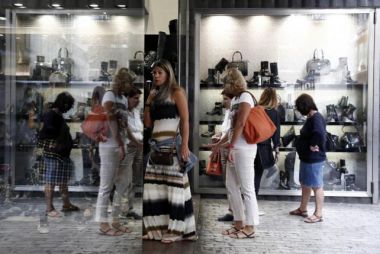In debt-mired Greece, Chanel designer bag becomes even more valuable than money

As Greece continues to sink ever deeper into economic uncertainty, some have chosen to use what's left of their money to purchase luxury items before the value of their currency goes next to nil.
Sophia Marcoulakis, a 48-year-old mother of two, is looking at investing at something more stable: a designer handbag. She would never have purchased one using her money before the banks shut down, but now she considers it a possession that even the government cannot take away, The Washington Post reported.
"You have a feeling that money has lost its value," said Marcoulakis, who works as a corporate lawyer. "It's just a number."
The level of distrust by Greeks toward their banking system has soared, but this crisis of confidence only serves to cripple further the country's struggling financial institutions. Many worry that some of their savings could disappear even under the best outcome of the fresh round of bargaining between Greek leaders and creditors over an aid package. Those who stockpiled on cash fear that the euro's value will crash, or that the drachma's return will leave them stranded with the wrong currency.
Greeks have started withdrawing money from banks in January after the leftist political party Syriza won parliamentary polls with promises of strong opposition against the creditors' harsh budget cuts in exchange for new aid.
Last month, the showdown between Greece and the rest of Europe escalated, while banks limited daily withdrawals to only 60 euros (about $67) as well as transfers abroad. Some stores have stopped accepting electronic debit transactions while credit card transactions on Amazon and iTunes have been disallowed.
Since the bank closures, 25-year-old Chric Dako, a waiter who has been paid in cash every day, planned to invest up to 500 euros of his money now trapped in his bank account on a new pair of shoes.
"Why shoes? The best," he said. "If they want to take some of my money, let me spend it first."
Some have decided to use their money to purchase luxury vehicles, whose sales have swelled even as the country defaulted on its loans. Official data linked the increase in sales to turnover in rental-car fleets, but some commentators think Greeks would rather purchase cars than stash their money in banks. This phenomenon in higher car sales have occurred in Cyprus before it imposed banking constraints and in Russia as the ruble's value plunged in December.
At Nikias in the rich community of Athens, the shop owner said he received 20 to 30 calls over the past week from people who are looking to buy gold and kilobars—the most expensive items in his store. However, he has stopped accepting electronic bank transfers as he worries over a potential loss on deposits.
"Then we would be the ones to have the problem," said the unnamed owner.











